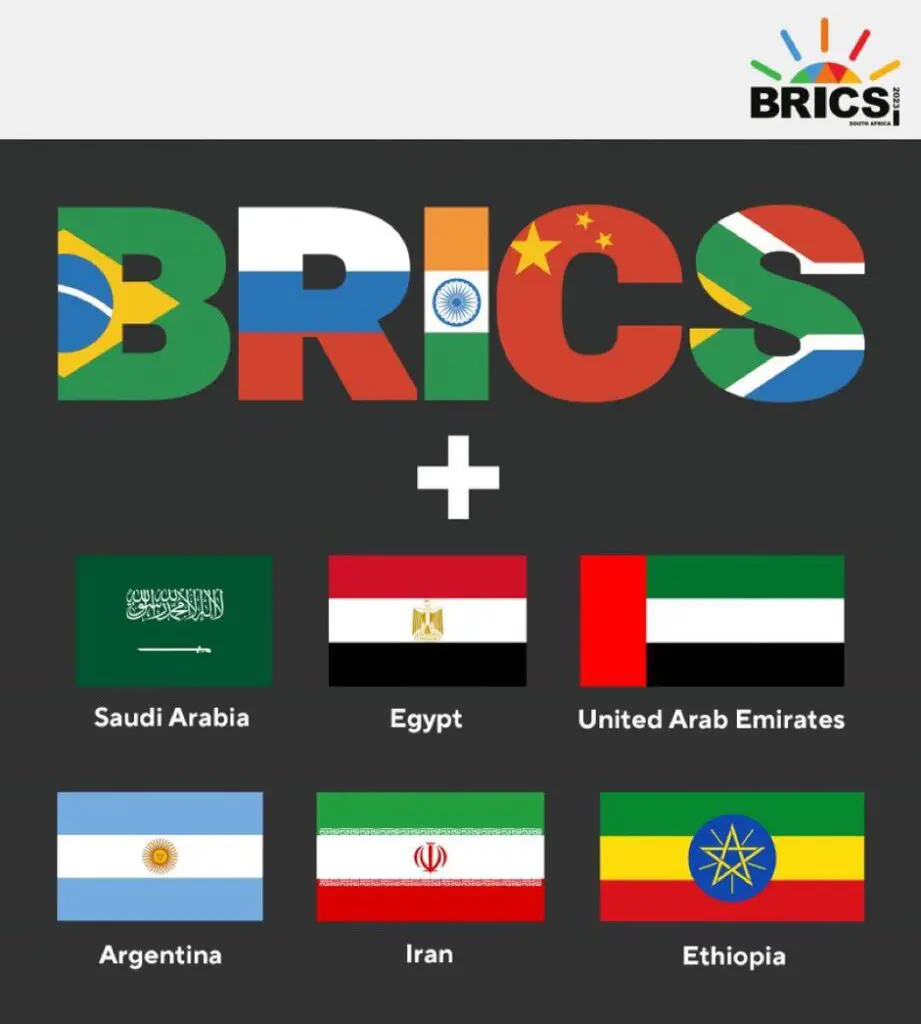- Egypt and Ethiopia will join BRICS alongside Saudi Arabia, Iran and Argentina starting January 1st, 2024.
- This takes membership into the bloc to three countries across the continent after South Africa.
- With the inclusion of Iran, Saudi Arabia, and the UAE, three major oil-producing nations globally will become part of the bloc.
Egypt and Ethiopia alongside oil-rich Saudi Arabia, Iran and Argentina have received an invite to join the BRICS bloc, originally formed by Brazil, Russia, India, and China in 2009. The momentous shift could reshape the global economic landscape and will take effect 1st January 2024.
Notably, this expansion comes at a time when geopolitical tensions between the West and the East have been escalating. In particular, the inclusion of Iran and Saudi Arabia in the BRICS bloc indicates a strengthening of the China-Russia-led coalition that could challenge the influence of Western powers.
South African President Cyril Ramaphosa, who is hosting a summit of BRICS leaders noted: “BRICS has embarked on a new chapter in its effort to build a world that is fair. A world that is just. A world that is also inclusive and prosperous.”
President Xi: Egypt, Ethiopia BRICS bloc entry historic
“This membership expansion is historic,” Chinese leader Xi Jinping noted, adding: “It shows the determination of BRICS countries for unity and development. Over the years, China has stood in solidarity with developing countries through thick and thin.”
Over 20 countries had formally lodged their pleas to join BRICS ahead of the summit in Johannesburg, a pointer to how the bloc is syncing with policymakers who want options in world order.
The expansion also reflects the commitment of the BRICS members to amplify the voice of the Global South and promote a fairer world order.
The announcement of the new members was made after intensive talks during the bloc’s 15th Summit in Johannesburg, South Africa. The forum was attended by leaders from Brazil, India, China, and South Africa.
Russian President Vladimir Putin engaged virtually due to complications arising from an International Criminal Court arrest warrant issued against him over the Ukraine conflict in March this year. The summit resulted in an agreement to expand the bloc and a list of new member countries, including two from Africa.
Three oil-rich nations invited into BRICS
The expansion of BRICS is poised to have a significant impact on the global economy and politics. With the inclusion of Iran, Saudi Arabia, and the UAE, three major oil-producing nations will become part of the bloc. This deal has the potential to recalibrate energy market dynamics and influence strategies related to oil production and distribution.
Saudi Arabia’s potential membership has set tongues wagging about Riyadh’s role in BRICS. Saudi Arabia’s vast pool of resources, wealth, and strategic location is giving rise to speculations about the country’s space in BRICS leadership. The Arabian country could also be strategically timed to help boost the bloc’s formation of New Development Bank. According to AP, the UAE’s diplomatic ties with Iran have been critical in facilitating the latter’s inclusion in the bloc, highlighting the changing dynamics in the Gulf.
Also Read: BRICS New Development Bank breaks away from the US dollar’s dominance
BRICS already accounts for 40% of global population
Economically, BRICS already represents a substantial portion of the world’s population and GDP, accounting for around 40 per cent and over a quarter, respectively.
With an estimated GDP of $113.3 billion, landlocked Ethiopia brings in a population of over 120 million people. Egypt, a North African economic powerhouse has a GDP of $404.1 billion and a population of approximately 110 million.
The addition of new members is expected to further enhance BRICS GDP and population share numbers. However, Argentina and Egypt, are grappling with significant debt burdens, raising questions about their economic significance in the bloc.
BRICS’ focus on unity and development is reflected in its expansion efforts. The new members’ eagerness to join the bloc indicates the appeal of an alternative global platform for collaboration and growth, especially in regions where these nations have expressed their concerns about the existing global financial architecture.
While the expansion of BRICS holds promise, a myriad of challenges lie ahead. As the organization grows, the diversity of interests and priorities among member countries could trigger internal wrangles.
Additionally, while the inclusion of Iran, Saudi Arabia, and the UAE together might have been unthinkable in the past, recent diplomatic shifts and mediation have paved the way for their collaboration within BRICS.
In a world marked by geopolitical complexities and economic interdependence, the expansion of the BRICS bloc symbolizes a changing tide of alliances and partnerships.
As these nations come together to amplify their collective influence and address shared challenges, the future of the global economic and political landscape look set for a transformation.

